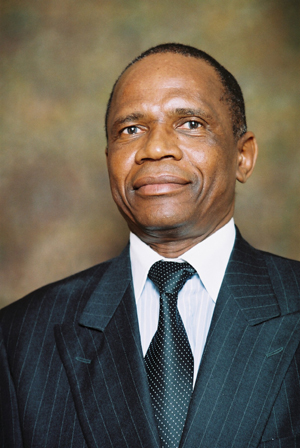Latest News Archive
Please select Category, Year, and then Month to display items
12 January 2024
|
Story Nonsindiswe Qwabe
|
Photo Sonia Small
 Since joining the UFS in 2008, Dr Grey Magaiza has worked extensively on approaches that can foster the socio-economic transformation of societies.
Since joining the UFS in 2008, Dr Grey Magaiza has worked extensively on approaches that can foster the socio-economic transformation of societies.
“The future should be one where communities can decide on their development agenda and futures. That’s the most important for me.” Dr Grey Magaiza, Deputy Director of the Centre for Gender and Africa Studies (CGAS) and Head of the Community Development programme on the Qwaqwa Campus, is passionate about capacitating communities to be agents of change and advancement. His vision for the future emphasises the empowerment of communities to take charge of their development by actively participating in decision making and the implementation of development projects that can improve their lives.
Since joining the UFS in 2008, Dr Magaiza has worked extensively on approaches that can foster the socio-economic transformation of societies. Over the years, he has crafted his research speciality into one that he is most proud of – being an interdisciplinary scientist immersed in the development of communities.
“I’m in a fortunate position of researching what I like. I say ‘fortunate’, because I’ve taken the time to understand what I’m passionate about, which is the overall field of rural livelihoods and livelihood futures – in short, community development. My research starts from an engaged university, understanding the elements that a university must use to enhance transformation and relevance to its immediate community in terms of development.”
One of the ways he has done this is by looking at social entrepreneurship as a development approach for young people in a rural setting. Through workshops with non-profit and civic organisations in Qwaqwa, Dr Magaiza has been helping these organisations to map out their needs and actively meet them through the involvement and support of external role players.
“We understand that communities are part of the national development agenda, but even that national agenda respects community knowledge and intentions and allows communities to shape their identity. A critical enabler of this is community organising. You bring back the capacity in communities to have dialogues on issues affecting them as spaces for engagement, knowledge exchange, and for people to just talk about their way forward.”
By enabling communities to define their development agenda, they can address their specific needs, challenges, and aspirations, he said. “When I look at livelihood futures, it’s quite an exciting aspect of my work – it’s like looking into a fortune tellers’ globe, because you’re not deciding for communities what they should do, but the communities themselves take those decisions.”
UFS holds memorial service for Prof Benito Khotseng
2015-01-09

Prof Benito Khotseng |
The management of the University of the Free State is saddened by the passing away of Prof Benito Khotseng, former Vice-Rector: Student Affairs at the UFS.
Prof Khotseng died from a heart disease on Sunday 4 January 2015 at the age of 67.
He joined the University of the Free State as a senior manager more than two decades ago.
According to family and colleagues, his death has left a void in the education fraternity.
Prof Kalie Strydom, who has been a colleague of Prof Khotseng for more than 20 years, described him as a principled leader who did not promote and argue educational issues in his own interest.
“His focus was never on benefitting opportunistically in the short term, whether professionally or financially. I had the privilege of participating with Benito in many meetings and fundraising efforts where the correct values/principles and the organisations/institutions for which he worked benefitted, but other than so often happens in life, Benito did not benefit personally. We celebrate him forever, though with tears in our eyes.”
A memorial service for Prof Khotseng will be held at the UFS’s Bloemfontein Campus:
Monday 12 January 2015
10:00
Albert Wessels Auditorium, Bloemfontein Campus, UFS